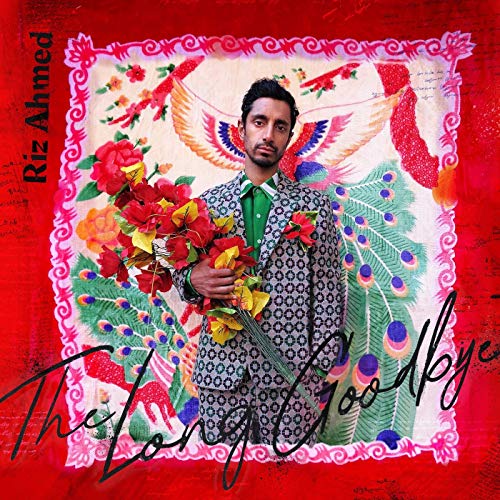The Long Goodbye
by Riz AhmedIt’s not unusual for an established actor to have a foray into other mediums, with music often being the preferred choice. Everyone from William Shatner to Robert Downey Jr., Steven Seagal to Ryan Gosling, have released albums.
With his debut solo effort, we can add British, award-winning actor Riz Ahmed - to that ever-growing list, but his is somewhat unique in that it’s really rather good.

The first track is ‘The Breakup (Shikwa)’, where Riz is in mournful mood as he describes the painful separation he’s gone through, but not with a recent partner, but with his country. It’s a truly personal account of how Britain, his country of birth, has turned his back on him. It certainly reveals how talented Riz is as a lyricist, with the track brimming with poignant poetry. Still, it’s a bit of a bummer to kick an album off with.
The energy certainly steps up a gear or two with ‘Toba Tek Singh’. It’s an extension of the theme of rejection from the first track, focusing in particular with the fallout of Brexit, but accompanied by some bad boy beats.
‘Fast Lava’ sees Riz spitting lyrics with machine gun speed, proving that this may not just be a vanity project after all. It’s just as well the track is relatively short, as Riz needed to replenish his lunges at some point.
It’s collaboration time, when this acting rapper gets some assistance by way of Jay Sean. It’s a bouncy track, but again, due to a fairly short running time, it doesn’t really have time to develop into anything more substantial.
With ‘Can I Live’, there’s a strong, underlying thread of anger, holding the track together. That said, one of its highlights is when the actor refers to his work in the excellent Four Lions, with its Rubber Dinghy Rapids reference.
There’s more time for reflection in ‘Where You From’, as it examines identity. Riz, A cappella, explores what the meaning is behind the question, stating that they probably don’t want to hear him say Wembley (represent), which is where he was born.

‘Mogambo’ brings the beat, with Riz again revealing the hypocritical nature of the beast he’s a part of. His fame, which he’s clearly worked hard for, supersedes his origin, as those with a possible racist agenda are willing to overlook the ‘offensive’ colour of his skin in favour of a selfie, which is generous of them.
Riz is in a more defiant mood with ‘Deal with It’, as he decides to make a stand, and promote a general feeling of acceptance.
Wrapping up proceedings is ‘Karma’. There’s a poppier vibe in the air, despite the continuing break-up theme that runs throughout. And before you know it, it’s officially over.
Although this is Ahmed’s solo debut, he has lyrical form, being a part of band Swet Shop Boys, where he also goes by the name of Riz MC. Tres urban. That said, this album is a curious effort.
It’s politically charged, and considering the changes that his home country has been going through, that’s completely understandable. But it’s a theme that’s a bit like Brexit itself, in that it outstays its welcome.
Ahmed proves himself as a talented musician, of that’s there’s no doubt, but it would have been interesting to hear what he has to say on other topics, maybe even more personal elements of his life.
To a certain extent, the album feels almost like a parody. It doesn’t take a genius to work out that the relationship he’s struggling with is with his country, which he insists on returning to with every track.
And although he’s clearly making a serious point, it feels watered down with his numerous showbiz pals leaving messages between tracks, who play along with the gag, checking in on the star to see if he’s OK with this ‘break up’. It’s the kind of thing you would expect from Eminem, but it’s a gag that wears a little thin, much like the album as a whole.
The biggest frustration is that unlike many of his acting peers, Ahmed knows his music, and shows a serious talent for it. But this concept/parody album feels on the hollow side, particularly when the longest track on here by some time is three and a half minutes, and the album itself comes in well under thirty, and that’s with all the celebrity messages padding. As statements go, this one doesn’t feel like the most defining one.
What it does do well is showcase his considerable talent, and that if he takes the notion of making an album more seriously, it will give him more of a voice worth listening to.

Gallagher must have saved his production budget for this the last track, ‘Gone’, which if you listen to it, also includes the kitchen sink. It’s a lush sound, laced with a wall of sound orchestra borrowed from the Bond studio. It’s a layered treat of noise, hitting all the right notes in a glorious fashion. It’s certainly a grand way to bring an album to a close, that’s for sure.
This will be probably be about as far away from an acceptable notion as you can get, but we are not keen on Oasis getting back together again. Nostalgia is vastly overrated, and today’s Oasis, which would have aging millenials craving the hits, making the band almost a version of their own tribute act.
Sure, they can kiss and make up as brothers, but with both producing interesting solo work, from a purely artistic way forward, they are better off apart.
Gallagher has produced a self-assured, confident album, which hints at possible further greatness to come. It resonates with all his obvious influences, but by doing so, it also gives it a cosy coherence. It’s also a surprisingly mature piece of work, which, without casting aspersions, you would expect from the Noel, but Liam comes across as knowing exactly what he’s doing. Our kid apparently is all grown up now.
It also feels, more importantly, that he’s got a grip on his own musical identity. He proves here that he’s not just the cocky, loud-mouthed frontman of a successful band, he can stand up there, on his tod, and be just as cocky and loud-mouthed, but on his own talented terms.
Why not indeed.
